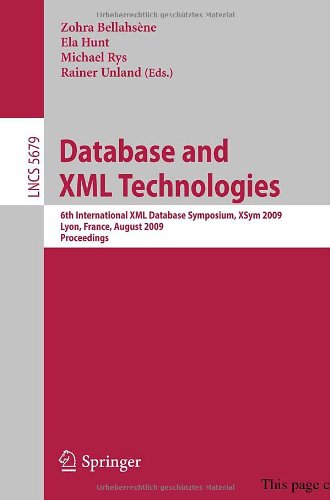

Most ebook files are in PDF format, so you can easily read them using various software such as Foxit Reader or directly on the Google Chrome browser.
Some ebook files are released by publishers in other formats such as .awz, .mobi, .epub, .fb2, etc. You may need to install specific software to read these formats on mobile/PC, such as Calibre.
Please read the tutorial at this link: https://ebookbell.com/faq
We offer FREE conversion to the popular formats you request; however, this may take some time. Therefore, right after payment, please email us, and we will try to provide the service as quickly as possible.
For some exceptional file formats or broken links (if any), please refrain from opening any disputes. Instead, email us first, and we will try to assist within a maximum of 6 hours.
EbookBell Team

4.3
28 reviewsSince its first edition in 2003, the XML Database Symposium series (XSym) has been a forum for academics, practitioners, users and vendors, allowing all to discuss the use of and synergy between database management systems and XML. The previous symposia have provided opportunities for timely discussions on a broad range of topics pertaining to the theory and practice of XML data management and its applications. XSym 2009 continued this XSym tradition with a program consisting of 15 papers and a keynote shared with the 12th International Symposium on Database Programming Languages (DBPL 2009). We received 26 paper submissions, out of which eight papers were accepted as full papers, and seven as short/demo papers. Each submitted paper underwent a rigorous and careful review by four referees for long papers and three for the short ones. The contributions in these proceedings are a fine sample of the very best current - search in XML query processing, including full text, keyword and loosely structured queries, stream querying and joins, and materialized views. Among new theoretical advances we included work on a lambda-calculus model of XML and XPath, on m- ping from the enhanced entity-relationship conceptual model to the W3C XML Schema Language, on transactions, and extensions to XPath. Finally, work on data parallel algorithms, compression, and practical aspects of XQuery, including query forms and the use of Prolog are also part of this volume.